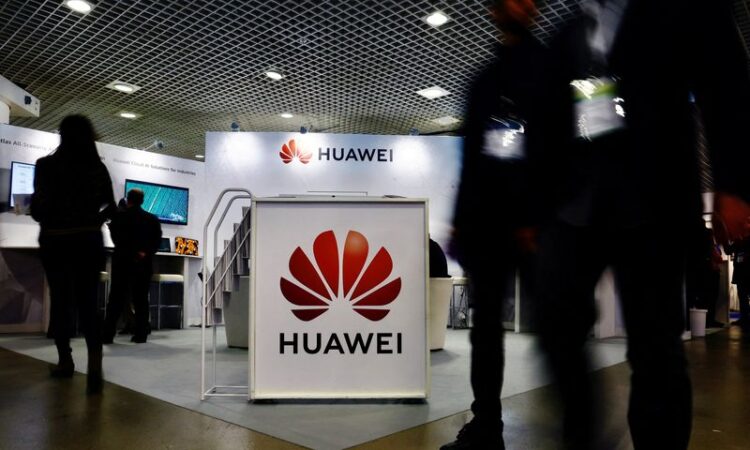
By Sarah Marsh, Supantha Mukherjee and Andreas Rinke
BERLIN/STOCKHOLM (Reuters) – The European Union is set to urge Germany to do more to reduce its use of Huawei gear in its 5G network when Brussels publishes a progress report in coming days, ahead of talks between Berlin and Beijing, two sources familiar with the matter said.
Germany is considered a laggard in implementing the EU’s toolbox of security measures for 5G networks agreed three years ago to curb the use of “high risk” vendors such as China’s Huawei due to concerns about possible sabotage or espionage.
EU officials will likely call out Germany and a handful of other countries for insufficient progress when they present the second 5G toolbox review in coming days, likely Friday, the two sources said. They will also criticise telecoms operators such as Deutsche Telekom, one of them said.
A European Commission spokesperson said he could only confirm the report was coming soon. Deutsche Telekom did not immediately reply to request for comment.
A European spokesperson for Huawei, which has strongly denied its equipment could be used for spying or sabotage by Beijing, said it had no knowledge of the contents of the report and reiterated that during its 20 years of operation in Europe there had been no record showing “backdoors” in its equipment.
Should Germany toughen its stance, that would be a major blow to Huawei given it is Europe’s largest economy, and the fact others would likely follow suit.
It could also send a signal to China that Germany is getting serious about prioritizing security over economic interests and isn’t a weak link in Europe due to its large trade with Asia’s rising superpower.
“This would be the nail in the coffin for Huawei in Europe,” said Paolo Pescatore, an analyst at PP Foresight.
The issue is likely to be a sticking point at China-Germany government consultations that are expected to take place on June 20. China has asked for Huawei to be one of the main points on the agenda, one of the sources familiar with the matter said.
China’s embassy in Berlin did not reply to request for comment. A German government spokesperson said it did not comment on internal plans.
“On the Chinese side, they obviously still see this as an area where there’s some room for manoeuvre,” said Andrew Small, author of “No Limits: the Inside Story of China’s War with the West”.
It was not just Huawei’s role in 5G but also broader digital infrastructure that was up for debate now, he noted. Germany’s China hawks expressed outrage in March when a Reuters story revealed that German state rail operator Deutsche Bahn was using Huawei gear to digitalise its operations.
Other countries such as Denmark and Portugal have already extended restrictions on perceived high risk vendors beyond 5G.
Mikko Huotari of the Mercator Institute for China Studies said Beijing would likely lobby Berlin to ensure any new EU-wide controls on Chinese technology were not too severe.
RIP AND REPLACE?
Telecom providers switched to using Huawei equipment over the last decade as the Chinese company supplied gear that was cheaper, but as good as, that of Finland’s Nokia and Sweden’s Ericsson, according to telecom experts.
However, the West has increasingly moved to restrict the use of Huawei in particular in 5G due to what critics say are its close links to Beijing’s security services. Huawei and China’s government reject these claims, saying the restrictions are a protectionist move to support non-Chinese rivals.
Berlin in 2021 passed a law setting high hurdles for makers of telecommunications equipment for the “critical components” of 5G networks. In the implementation of that law, however, it defined those narrowly compared to other countries, and did not consider equipment already built in.
In answers to parliamentary queries in recent months, the government has acknowledged it did not know what percentage of Huawei gear was already built into 5G networks and whether it could pose a security risk.
In March, Berlin announced a review of telecoms suppliers to determine this, which it expects to conclude this summer.
“The problem is we didn’t actually know what the companies were doing and whether Huawei had already been built into critical sectors,” said one government official.
“We also have to consider the technical developments: are the risks today the same as a few years ago?”
A second government source said the review would determine whether the government needed to implement its IT security law more strictly.
It is estimated it would cost billions of euros to rip out and replace Huawei equipment in European countries, potentially burdening telecom companies already sitting on huge debts.
In the U.S., its telecom regulator has said that companies have requested $5.6 billion in aid for replacing Chinese gear.
Telecoms operators would struggle to ensure minimal disruption to networks, said Pescatore.
However, “the removal of Huawei kit would present further opportunities for rivals”, he added.
(Reporting by Sarah Marsh and Andreas Rinke in Berlin and Supantha Mukherjee in Stockholm; Additional reporting by Foo Yun Chee in Brussels and Sergio Goncalves in Lisbon; Editing by Mark Potter)






